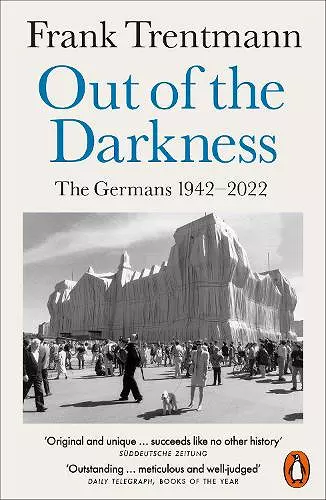Out of the Darkness
The Germans, 1942-2022
Format:Paperback
Publisher:Penguin Books Ltd
Published:7th Nov '24
Should be back in stock very soon
This paperback is available in another edition too:
- Hardback£40.00(9780241303498)

Shortlisted for the 2024 Wolfson History Prize
A Telegraph and Der Spiegel Book of the Year
Sueddeutsche Zeitung's Number One Most Important Political Book of 2023
Die Zeit, ZDF, Deutschlandfunk, taz Number One, Best Non-Fiction Books December 2023 and January 2024
A Telegraph and Der Spiegel Book of the Year
Sueddeutsche Zeitung's Number One Most Important Political Book of 2023
Die Zeit, ZDF, Deutschlandfunk, taz Number One, Best Non-Fiction Books December 2023 and January 2024
A groundbreakingnew history of the people at the centre of Europe, from the Second World War to today
In 1945, Germany lay in ruins, morally and materially. The German people stood condemned by history, responsible for a horrifying genocide and a war of extermination. But by 2015 Germany looked to many to be the moral voice of Europe, welcoming almost one million refugees. At the same time, it pursued a controversially rigid fiscal discipline and made energy deals with a dictator. Many people have asked how Germany descended into the darkness of the Nazis, but this book asks another vital question: how, and how far, have the Germans since reinvented themselves?
Trentmann tells the dramatic story of the Germans from the middle of the Second World War, through the Cold War and the division into East and West, to the fall of the Berlin Wall and the reunited nation's search for a place in the world. Their journey is marked by extraordinary moral struggles: guilt, shame and limited amends; wealth versus welfare; tolerance versus racism; compassion and complicity. Through a range of voices - German soldiers and German Jews; environmentalists and coal miners; families and churches; volunteers, migrants and populists - Trentmann paints a remarkable and surprising portrait over 80 years of the conflicted people at the centre of Europe.
I could not put the book down. The way Frank Trentmann writes history, the way he brings together things great and small, analysis with narrative, is wonderful -- Bernhard Schlink, author of The Reader
Outstanding ... A meticulous and well-judged account of Germany from 1942 to today [that] shows how it transformed itself from pariah nation to leader of a continent -- Simon Heffer * Daily Telegraph, Best Books of the Year *
An impressive account of how Germany built a new identity for itself after the barbaric Nazi years ... terrifically insightful ... This book runs to 838 pages, but barely a word is wasted. Trentmann is a skilful and unflashy storyteller with flickers of gentle irony. Echoing Tolstoy’s theory of history as the “sum of human wills”, he aims to stitch the scraps of everyday experience into a quilt of grand narrative. This results in a good deal of richness, colour and subtlety -- Oliver Moody * The Times *
Compelling ... vivid ... fresh ... one of the most impressive studies I have read of German guilt and shame ... an eloquent and original account of the last eighty years of the country’s history -- David Blackbourn * Literary Review *
Absorbing... Frank Trentmann's approach is novel [and] his Germans leap vividly off the page, both as archetypes and as complex, multi-layered individuals... an excellent book -- Brendan Simms * New Statesman *
Superb -- Stuart Jeffries * Spectator *
In Out of the Darkness Trentmann does something different and extraordinary. He has composed an account of recent Germany that is not primarily political or economic or social, but moral.. [His] moral history is enormous, but never heavy-going: he is a gifted and intelligent writer -- Neal Ascherson * London Review of Books *
Excellent ... Trentmann's study marshals an immense amount of evidence in response to a single basic question: how did Germans reassert themselves as morally oriented human beings? -- Ben Hutchinson * Times Literary Supplement *
Remarkably rich . . . Out of the Darkness usefully reveals the roots of [modern Germany's] ethical knots. Trentmann is still hopeful that Germans can untangle them -- Peter Fritzsche * New York Times Book Review *
Out of the Darkness give[s] a deep insight into how Germany and its people grappled with questions of guilt and identity.... navigates complex issues like self-pity, denazification, immigration, reunification and military intervention with refreshing clarity. This book couldn’t be more timely -- Katja Hoyer * BBC History Magazine *
ISBN: 9780141985848
Dimensions: 198mm x 130mm x 41mm
Weight: 628g
880 pages